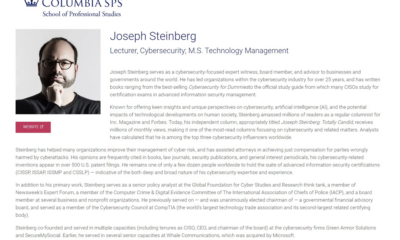Unlocking the Importance of Cybersecurity for Business Success
In today’s digitally driven world, in which businesses heavily rely on computer systems and the information living within such systems, the importance of cybersecurity cannot be overstated. As organizations embrace digital transformation, and delver further and further along the path towards such, they open themselves up to a myriad of cyber threats. Because failing to remain cybersecure can literally cause a business to fail and go entirely “out of business,” understanding and prioritizing cybersecurity is not just a matter of protecting sensitive data; it is a fundamental component of ensuring business success, continuity, and resilience in the face of an ever-evolving threat landscape.
Safeguarding Sensitive Data
One of the primary reasons cybersecurity is crucial for business success is the protection of sensitive data. Businesses handle vast amounts of information, including PII (Personal Identifiable Information) and other customer data, financial records, and proprietary intellectual property. A security breach can result in the compromise of this sensitive information, leading to severe consequences such as financial losses, reputational damage, shareholder lawsuits, and potentially regulatory fines and criminal charges.
Securing systems and data is complicated – but, both must be done. And done effectively. A cybersecurity plan must include policies and procedures – and methods of both implementing them and testing that they are being enforced.
Cybersecurity measures, including robust encryption, secure authentication protocols, and regular security audits, can, of course, be utilized as part of a formidable defense against unauthorized access – but no security technologies should be deployed ad-hoc; security must be well planned and implemented carefully.
By safeguarding sensitive data, businesses not only protect themselves and their customers but also build trust and credibility in the eyes of clients, partners, and regulatory bodies.
Mitigating Financial Risks
Cybersecurity is an integral part of risk management for businesses. The financial implications of a successful cyber attack can be catastrophic. The costs associated with data breaches, system disruptions, and the aftermath of cyber incidents can quickly escalate. Investing in a proper cybersecurity program is a proactive strategy to mitigate these financial risks; while cybersecurity technologies might play a major role in such a program, cybersecurity insurance might serve as role as well. And, after performing a proper risk analysis, a company’s leadership may determine that some risks are not worth mitigating against.
That said, consider the expenses related to recovering from a cyber attack – from conducting forensic investigations to implementing security enhancements and compensating affected parties. Cybersecurity acts as a financial safeguard, preventing potential losses and ensuring that resources are allocated towards growth and innovation rather than recovering from a security incident.
When it comes to cybersecurity, an ounce of prevention often equals many tons of cure.
Maintaining Operational Continuity
Cybersecurity is not about only protecting data from being stolen or destroyed. Data must also remain available and maintained with proper integrity – this should be of no surprise as business operations rely on data being available and accurate, and business success is directly tied to operational continuity. Any disruption to regular operations can have cascading effects, impacting productivity, customer satisfaction, and revenue streams. Cybersecurity plays a pivotal role in maintaining operational continuity by preventing and minimizing the impact to operations from both cyber incidents and other disasters that threaten system availability.
Business continuity plans are essential; by leveraging measures including robust backup systems, disaster recovery plans, and real-time threat monitoring, businesses can ensure that even in the face of a cyber attack, operations can continue unhindered, or at least resume swiftly and efficiently after a manageable and acceptable outage. Resilience of such nature is a key factor in sustaining business success, especially in industries where downtime can result in significant financial losses.
Building Customer Trust and Reputation
A business’s reputation is often one of its most valuable assets.
A single cybersecurity incident, however, can easily erode the trust that customers, partners, and stakeholders have built over time. News of a data breach or security lapse can spread quickly, leading to reputational damage that may take years to repair, if it is even reparable.
Prioritizing cybersecurity, and being transparent about your cybersecurity program, demonstrates a commitment to the protection of customer data and the overall security of transactions in which they are involved. When customers feel confident that their information is secure, they are more likely to trust a business – cybersecurity budgets can, therefore, translate into improved long-term relationships and brand loyalty. In an era in which consumers are increasingly concerned about data privacy, cybersecurity can become a playable competitive advantage that can contribute to business success.
Meeting Regulatory Compliance
As I will discuss in a future article, the regulatory landscape for cybersecurity is continually evolving, with governments and various industry bodies around the world enacting increasingly stringent measures that seek to protect consumer data and privacy – both in terms of requiring proactive security requirements and mandating reactive disclosures after cybersecurity incidents.
Non-compliance can, of course, lead to severe penalties, legal action, and reputational damage.
As such, business success is intrinsically linked to proper regulatory compliance. If a business wishes to avoid legal consequences and maintain the trust of stakeholders, it must ensure that its cybersecurity program (and any related policies, procedures, and countermeasures) align with regularly evolving regulations
A proactive approach to cybersecurity, coupled with a thorough understanding of relevant laws, ensures that the business meets, if not exceeds, mandatory compliance standards.
Adapting to an Evolving Threat Landscape
Cyber threats are dynamic and continually evolving. Cybercriminals employ sophisticated techniques to exploit vulnerabilities in systems and networks. To ensure ongoing business success, organizations must be proactive in adapting to this ever-changing threat landscape.
Regular cybersecurity assessments, gatherings of threat intelligence information, and the adoption of advanced security technologies can prove to be crucial components of staying ahead of potential risks – but, all of these, should be part of a comprehensive, formal, organized security plan.
Businesses that invest in continuously improving their cybersecurity posture are often far better equipped to detect and neutralize emerging threats than are their competitors. The importance of such a competitive advantage can become explicitly clear when a cyberattack hits several competing firms.
Educating the Workforce
In the realm of cybersecurity, the workforce is both a potential vulnerability and a valuable line of defense. Human error, often unintentional, is one of the primary catalysts (if not the primary catalyst) of security breaches.
Educating employees about cybersecurity best practices is essential in creating a security-conscious culture within the organization. Cybersecurity awareness training empowers employees to recognize and respond to potential threats. This not only enhances the overall security posture but also contributes to a resilient organizational culture where every team member plays a role in safeguarding the business. As a result, the workforce becomes an active participant in the success and security of the organization. But, cybersecurity training should not just make people aware of the need for cybersecurity – it should help them learn to internalize that the threat is both significant and real. People who believe that they are targets simply behave differently than those who do not actually believe such.
Conclusion
In the digital age, cybersecurity is not just a technical necessity but a strategic imperative for business success. Safeguarding sensitive data, mitigating financial risks, maintaining operational continuity, building customer trust, meeting regulatory compliance, adapting to an evolving threat landscape, and properly educating all humans involved are all integral aspects of a comprehensive cybersecurity strategy, and should be included in a robust, comprehensive, formal cybersecurity program.
Businesses that recognize the importance of cybersecurity and invest in robust measures are better positioned to thrive in the digital landscape. As the threat landscape continues to evolve, the success and resilience of businesses will increasingly depend on their ability to navigate the complex and dynamic world of cybersecurity. Prioritizing cybersecurity is not just an investment in technology; it is an investment in the future success and sustainability of the business – and, in many cases, a significant competitive advantage.













 CyberSecurity for Dummies is now available at special discounted pricing on Amazon.
Give the gift of cybersecurity to a loved one.
CyberSecurity for Dummies is now available at special discounted pricing on Amazon.
Give the gift of cybersecurity to a loved one.